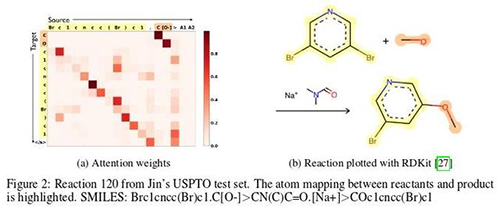
Artificial intelligence has been empowering all walks of life and providing new research tools. Recently, scientists at IBM Research Institute have studied organic chemistry from a new perspective and creatively used artificial intelligence to help them predict the generation of organic chemical reactions.
Scientists treat atoms in chemical reactions as letters and molecules as words, and then use artificial intelligence language translation algorithms to predict organic chemical products. This technology is expected to greatly accelerate the development of new drugs and new materials.
Related papers were presented at the recently concluded NIPS 2017 conference on Deep Learning Molecular and Materials Applications.
For the past 50 years, people have been working to teach computers to understand chemical processes in order to help chemists predict the generation of chemical reactions. However, due to the complexity of organic chemistry, it is very time consuming to simulate such a chemical reaction. It has long been desired to have a better way to solve the simulation problem of organic reactions.
Inspired by deep learning applications, IBM scientists have considered this issue from a different perspective. They use artificial intelligence translation programs in natural language processing to deal with organic chemistry problems. “Usually artificial intelligence does translate English into Chinese or German, but in our research, we have the same program to process chemical atomic molecules. We provide millions of chemical reaction data to the program, let it Learning the "language" structure of organic chemistry, and then trying to predict the possible products of chemical reactions."
Teodoro Laino, a researcher at IBM Zurich, said: "We hope to use this tool to design new synthetic pathways for organic compounds. It is often difficult to synthesize drugs and other complex organics. This work can bring organic chemistry research. The rapid progress has made both commercial and academic benefits and research time shortened and the scope of exploration increased."

This new artificial intelligence program is a neural network that is connected by a number of neurons in a certain form. After a large amount of data training, the weights of these connections are constantly adjusted to obtain better results. Through continuous learning, neural networks can find the best model for solving practical problems, which is very similar to the research and exploration process of organic chemistry. Similar to the process of children learning to speak, they do not know the grammar and rules but are fluent in their expression. AI is initially ignorant of organic chemistry, but it is still possible to predict the chemical reaction by learning.
In the actual process, AI can be considered in a variety of ways, providing multiple solutions based on probability, while achieving an accuracy of more than 80%. At present, the molecules that AI can process contain up to 150 atoms, but theoretically there is no upper limit to the size of molecules that can be processed, and longer molecules can be processed if needed.
The paper collaborator Théophile Gaudin said that he hopes to deploy this work to the cloud platform for use by engineering and researchers around the world. At the same time, we must continue to improve the accuracy of the algorithm to more than 90%. Unlike the more general-purpose models, they plan to use more specific models for different types of organics to improve accuracy.
In the next study, factors such as temperature, solvent and pH will be taken into consideration to expect further improvement in accuracy. Because AI is not perfect, the researchers created this tool not to replace organic chemists, but to provide a powerful assistant to chemists.
Original title: Another new use of artificial intelligence: IBM uses AI to predict chemical reaction results, which can be used to speed up the production of new drugs.
We, Jiangsu YanFang Medical Technology Co., Ltd, commenced our medical gloves manufacturing in 2020. Currently, we possess a total of 12 high-capacity NBR Glove Dipping Production Lines.
Likewise, we are not only certified with ISO9001, ISO13485 but also fully complied with the essential USFDA, CE Compliances, as well as obtaining relevant accreditation of FDA510K, EN455, and EN374.
Nonetheless, our NBR Examination, Chemotherapy, and Food Grade products are being well established in both US and Europe markets.
We look forward to cooperating and working closely with our valuable customers and stakeholders, who are seeking long-term business relationships in high-quality NBR glove supplies.
Medical Grade Nitrile Gloves,Nitrile Grade Medical Gloves,Medical Examination Nitrile Glove,Blue Examination Nitrile Gloves
Jiangsu Yanfang Medical Technology Co.,Ltd. , https://www.yanfangchina.com